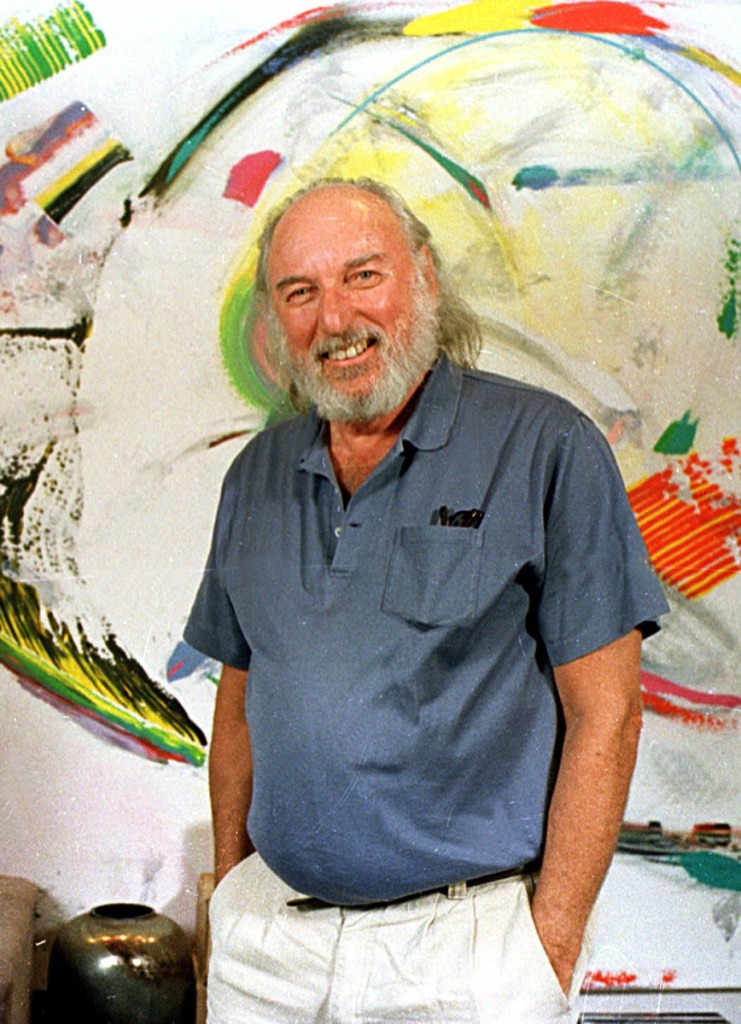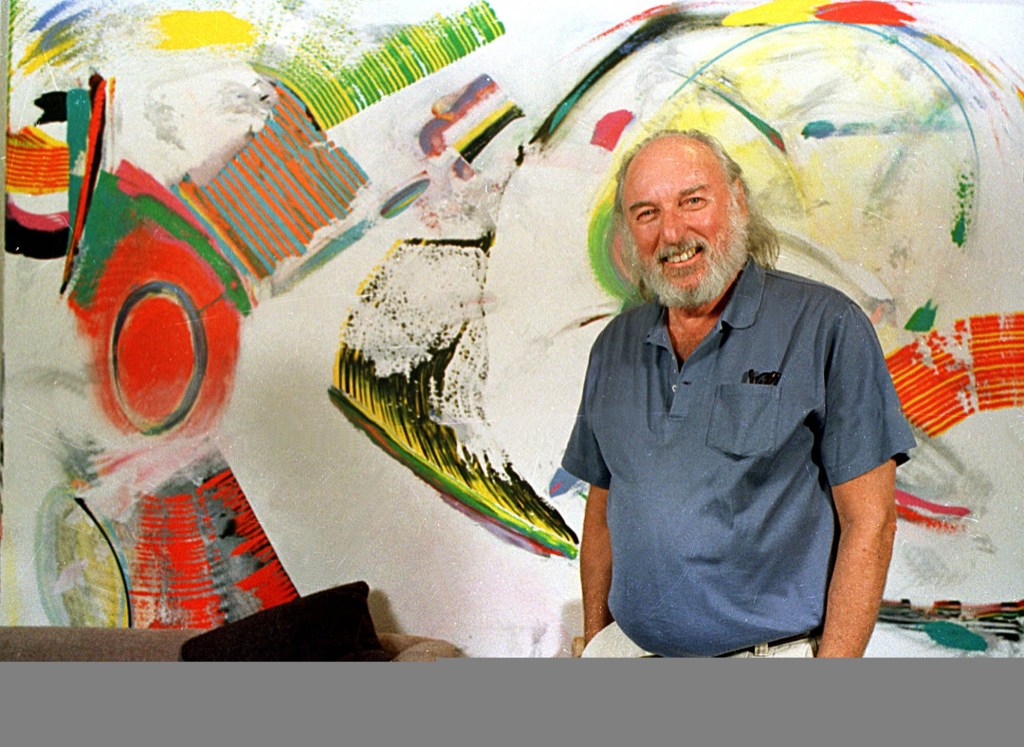LOS ANGELES — Tower Records long boasted of being “the largest record store in the known world,” a boast that few of the old retail chain’s regulars would have debated.
The slogan was characteristic of Tower’s colorfully eccentric, larger-than-life founder: Sacramento businessman Russ Solomon, long known and admired for his passion for music – a quality that often trumped his business acumen – and personal idiosyncrasies such as confiscating neckties of employees, salespeople or customers.
“What happened was that all these record guys came out from the East wearing suits and ties and I’d say, ‘Hey, this is California. You can’t dress like that here,’ ” he told the Los Angeles Times in 1980. “And then I’d rip the ties off and put them on the wall.”
True to form, Solomon died Sunday at his home in the state’s capital while watching the Academy Awards telecast with his family and sharing his thoughts on what he liked about what he was seeing – and what he didn’t. He was 92.
“Ironically, he was giving his opinion of what someone was wearing that he thought was ugly, then asked (his wife) Patti to refill his whiskey,” his son and former business partner Michael Solomon told the Sacramento Bee on Monday. “When she returned, he had died.”
Solomon nurtured Tower Records from a side business in which he started selling records out of his father’s drugstore to a mammoth international concern that posted sales of more than $1 billion in 1999.
Its growth mirrored the recording industry’s transformation in the 1960s and 1970s from a wild and woolly singles-dominated business run by similarly individualistic entrepreneurs into a powerful global force built around the sales of albums.
At its height, Tower had stores across the U.S., Central and South America, Europe and Japan, and expanded its offerings beyond the comprehensive music selection to similarly wide-ranging sections filled with books and videos.
It won the loyalty of rank-and-file music fans as well as celebrities such as Elton John, Tom Petty, Bruce Springsteen, Mick Jagger and superstar producer-music executives including Rick Rubin and Jimmy Iovine. Nirvana/Foo Fighters member Dave Grohl was once a Tower employee.
“I could have probably bought Los Angeles for the money I spent in Tower Records,” veteran English rocker John said during a free concert two years ago in the West Hollywood parking lot of Tower’s former Sunset Strip store.
Tower employees often would open the doors early for John when he was in town. “Tuesday mornings, I would be at Tower Records,” John said in a well-regarded 2015 documentary “All Things Must Pass: The Rise and Fall of Tower Records” by director Colin Hanks, the son of actor Tom Hanks. “It was a ritual, and it was a ritual I loved. I mean, Tower Records had everything.”
Hanks told NPR that his motivation was that “Tower sort of helped pave the way for your identity. For lack of a better phrase, music makes people, sometimes, where you sort of latch on to music as a way of identifying yourself or your tribe. I got that at Tower Records.”
Solomon took part in a question-and-answer session in conjunction with the L.A. premiere of the film at ArcLight Cinema in Hollywood, where he was given a standing ovation at the end of the film.
When Tower entered the first of two bankruptcy filings in 2004, it sparked an outcry among longtime customers that was unusual in the business world. Regulars attributed it to Tower’s reputation for a user-friendly experience in the stores and smart, engaged employees.
Tower’s business model also reflected an earlier era in American business, when employees could start at the bottom and work their way up. “All Things Must Pass” included interviews with several Tower executives who began as clerks.
“The people who work here are more knowledgeable and more helpful, and I don’t mind paying a little more for that service,” Newport Beach resident Allan Lewis told the Times as he patronized the Tower store in Costa Mesa shortly after news of the bankruptcy action surfaced.
“When I came in here today, I asked where the classic films are and the woman over there not only told me where they were, she walked me over here,” Lewis said. “Most other places, the kids who work there think a classic film is one that was released last year.”
Russell Malcolm Solomon was born in Sept. 22, 1925, in Sacramento. At age 13 he began working in his father Clayton Solomon’s drugstore in the Tower Theater building. Within three years he began selling used records from jukeboxes out of space his father let him use. The teenager called his nascent operation Tower Record Mart.
He served two years in the Army during World War II but continued selling records upon being discharged. In 1960, Solomon borrowed money and opened a new location called Tower North in North Sacramento – the first free-standing Tower – and oversaw growth that paralleled the blooming of rock music in the 1960s.
At the time, such music-focused destinations were an anomaly, as most records were sold in department stores such as Sears, Woolworth’s and JC Penney.
In Hollywood, music fans could patronize Wallichs Music City, and audition records using in-store listening booths, an idea Solomon also integrated into Tower.
In expanding Tower first to San Francisco, and later to Los Angeles, New York – in Times Square, no less – and major cities around the globe, he built the company into a retail destination. He also innovated an in-store music publication when he introduced Tower Pulse, a free magazine that not only contained record company ads, but articles written by music journalists in various cities.
“Without Tower Pulse, who’s to say where my career would be?” longtime music journalist and author Holly Gleason wrote Monday on Facebook. She ended her post by quoting the magazine’s slogan, “‘We listen to a lot of records. We write about the good ones.’ “
As detailed in Hanks’ film, Tower was slow to respond to changes in the marketplace, notably the revolutionary arrival in the late 1990s of the internet, and especially the Napster file-sharing site that let music fans trade files for free.
It was a triple whammy of changes that came in tandem with deep discounting practices of big-box stores such Walmart and Best Buy that used CDs (and videos) as loss leaders to attract customers into their stores. The advent of Amazon and other online retailers also cut significantly into the business of brick-and-mortar operations such as Tower.
Still, Solomon continued building new stores on leveraged money, its debt once reaching as much as $300 million. “We borrowed too much money,” he said in retrospect. “It wasn’t sustainable.”
Even after Tower’s demise in 2006, Solomon opened yet another store, R5, smaller in scope, before selling it in 2010 to Dimple Records.
“You may be crazy but you do it anyway,” he said in an interview at the time, his comment exhibiting the refreshing candor that made him an anomaly in the usually button-down world of music retailers. “It’s a little like a painter (who) gets to retirement age and doesn’t retire.”
Send questions/comments to the editors.




Success. Please wait for the page to reload. If the page does not reload within 5 seconds, please refresh the page.
Enter your email and password to access comments.
Hi, to comment on stories you must . This profile is in addition to your subscription and website login.
Already have a commenting profile? .
Invalid username/password.
Please check your email to confirm and complete your registration.
Only subscribers are eligible to post comments. Please subscribe or login first for digital access. Here’s why.
Use the form below to reset your password. When you've submitted your account email, we will send an email with a reset code.